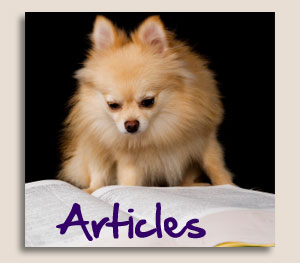The
holiday season can get pretty
hectic and with the decorations and extra goodies around
the house, there's a lot your pet can find to get into. Here
are a few safety tips to help keep your pets safe and happy
during the festivities.
Christmas Trees
Firmly secure the tree in its stand and consider wire or
twine ties attached to the wall to help secure the tree.
You’ll want to make sure the tree doesn’t topple
over if or more likely when kitty tries to climb the
tree.
Dogs and cats will often try to drink water from the reservoir
in the stand. The sap from the tree itself may irritate your
pet's stomach and preservatives added to the water may be
toxic. Devise a cover to fit around the base of the tree — even
a towel wrapped around the trunk covering the stand will
do.
Ornamentation is very attractive, especially to kittens and
cats but may be deadly. The tinsel, ribbon and glitter can
cause intestinal blockages. Protect your cat by placing these
items high enough to be out of reach. Packages under the
tree may offer the same threat — the ribbons are just
too hard to resist and kitty may end up chewing on them
while playing.
Those Wonderful Goodies
Holidays are the time for lots of baking and receiving of
baked gifts. These items smell just wonderful to your pet.
Your dog may help himself to the candy, cookies or part
of the holiday meal if you aren't looking. Eating “people
food” may lead to indigestion, diarrhea or worse. Remember,
items containing chocolate can poison a dog, even if it
is a small amount.
Remains of the holiday meal left on countertops, tables
and even in the garbage, will entice your pets. If there's
a way to get to it, be assured your dog will certainly try.
Bones from turkey, a roast or ham may splinter if eaten.
Older garbage may even contain enough bacteria to poison
a pet. Be careful where the trash is held while waiting to
be disposed.
Other Decorations
Plants, especially poinsettias, are often used for decoration
in November and December. Some of these plants contain
toxins that can irritate your pet’s gastrointestinal
tract if chewed on or eaten. Eating enough of some plants
may poison your dog or cat. In some cases it may be the
leaves, in others the stem, berries or roots. Your veterinarian
can help guide you or you can do a bit of research at
the library or online to see if any of your holiday plants
may be harmful to your pets.
Taking a few minutes to set some family guidelines and spot
potential safety hazards could keep this holiday season from
having serious consequences for your four-footed family member.
This article is provided as a general overview of the topic.
Always consult your veterinarian for specific information
related to diseases or medical care for pets. back to Articles main |








